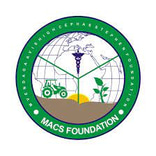Mechanised and Climate Resilient Agriculture
An Integrated Approach for Nigeria
THE MACS FOUNDATION
3/31/20252 min read


Mechanised and Climate Resilient Agriculture: An Integrated Approach for Nigeria
In Nigeria, agriculture remains a critical sector, employing over 70% of the population and contributing significantly to GDP. However, challenges such as low mechanisation levels, erratic weather patterns, land degradation, and limited access to modern technology threaten food security and economic growth. Adopting mechanised and climate-resilient agriculture can address these challenges, modernising the sector while promoting sustainability.
Relevance to Nigeria
1.Mechanisation in Nigerian Agriculture
Low Mechanisation Rate: Nigeria’s mechanisation rate stands at 0.27 horsepower per hectare, far below the FAO recommendation of 2.0. Increased access to tractors, harvesters, and other machinery can bridge this gap.
Policy Alignment: Initiatives like the Agricultural Promotion Policy (2016-2020) and the Green Imperative Project aim to provide mechanisation hubs and increase access to modern equipment.
2. Climate Resilience for Nigeria's Agriculture
Impact of Climate Change: Nigerian farmers face prolonged droughts, flooding, and unpredictable rainfall patterns, which affect crop yields. Adaptive Practices: Promoting drought-resistant crops like millet, sorghum, and cassava can help mitigate the effects of climate change.
Water Management: Investing in irrigation systems and water storage infrastructure, especially in the northern regions, can boost dry-season farming.
3. Sustainability in Nigerian Farming
Degraded Land: Unsustainable farming practices have left over 35% of Nigeria’s arable land degraded. Techniques like agroforestry and crop rotation can restore soil fertility.
Renewable Energy: Solar-powered irrigation systems are viable for off-grid farming communities, especially in rural areas.
Eco-Friendly Inputs: Encouraging the use of organic fertilizers and reducing overdependence on synthetic chemicals can improve long-term soil health.
Benefits for Nigeria
Enhanced Food Security: Mechanized farming and climate-smart practices can increase food production to meet the needs of Nigeria’s growing population.
Economic Growth: By creating jobs in machinery operation, equipment sales, and agro-processing, the sector can drive rural development and reduce unemployment.
Export Potential: Mechanisation enables Nigeria to compete in global markets by producing high-quality crops at scale.
Climate Mitigation: By adopting resilient and sustainable practices, Nigeria can reduce its agricultural carbon footprint while combating deforestation and desertification.
Case Study: Nigeria's Green Imperative Project
This partnership between Nigeria and Brazil aims to deploy 10,000 tractors and train over 100,000 operators across the country. It showcases a strong move toward mechanisation and sustainability, creating a model for integrating climate resilience.
Mechanised and climate-resilient agriculture is not just an option for Nigeria but a necessity. By leveraging its vast agricultural potential, implementing innovative solutions, and addressing climate challenges, Nigeria can ensure a prosperous and food-secure future for its people

Impact
Empowering communities for a sustainable future together.
Join
Act
macsfoundation2022@gmail.com
contact@macsfoundation.org
+234-803-614-8177
+234-802-050-6099
© 2025. All rights reserved.
Quick Links
Adress
Suite1 The Partners Mini Mall, #1 Fortress Avenue, Da' Fortress Estate, Piya Kassa Lugbe, FCT, Abuja
